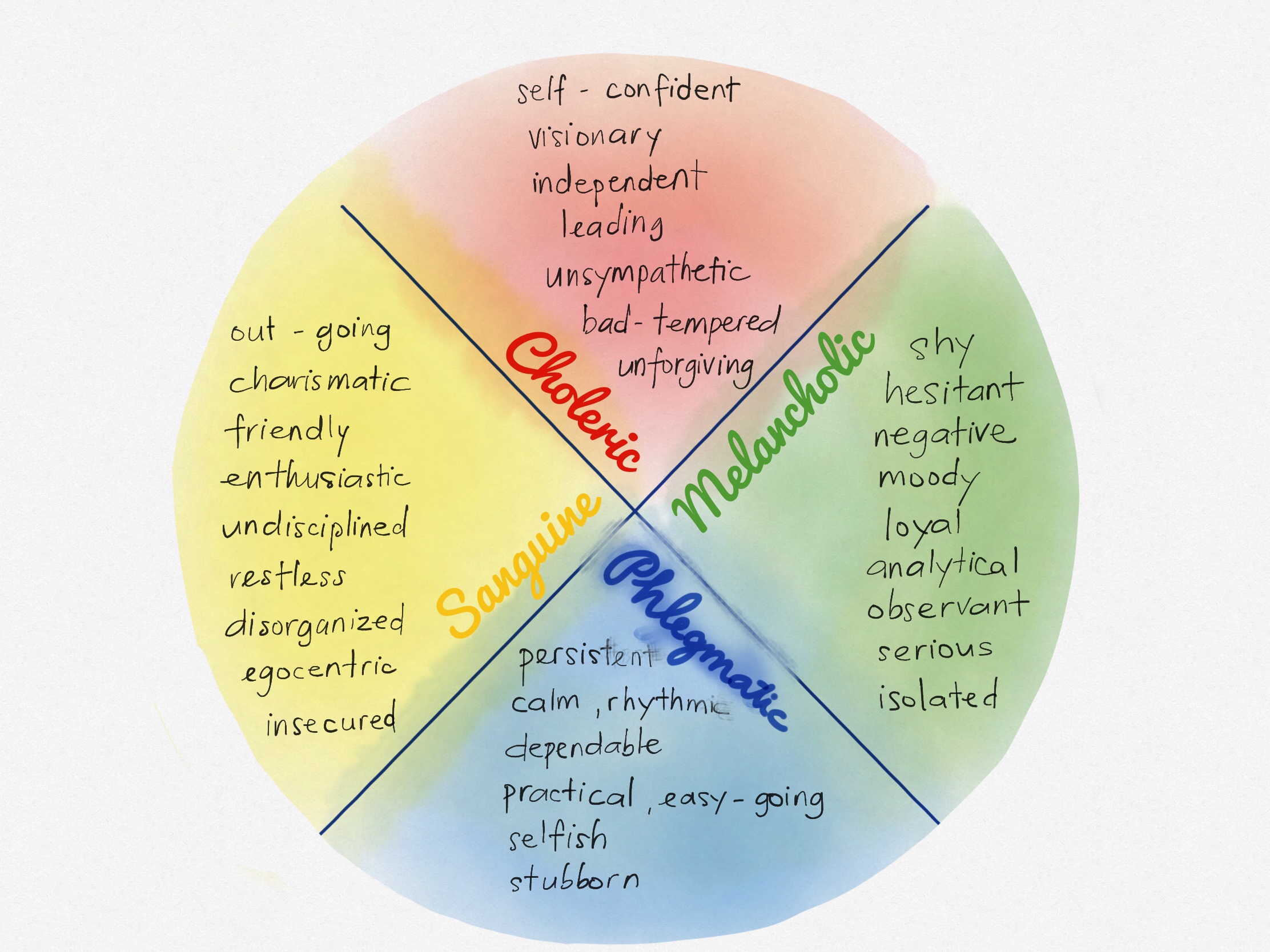Mình đang viết một bài tóm tắt ngắn gọn về 4 tính khí theo cách nhìn của Anthroposophy nên mình để đây cho các bạn nào chưa biết về chủ đề này cùng tham khảo nha.
Mình vừa được chỉ ra là mình phạm 1 lỗi chính tả to bự: “PHLEGMATIC” chứ không phải “plegmatic” – cái này là do không biết từ này từ trước, không biết ý nghĩa và sự liên quan của nó trong Anthroposophy, và do ẩu không kiểm tra lại kỹ nên sai luôn từ đầu tới cuối. Nhờ cô Jules trong phần bình luận chỉ ra cho mình, nên nay mình sửa lại ở dưới nha.
According to Rudolf Steiner, the four bodies of man are connected to the four classical elements: earth, water, air and fire.
MELANCHOLIC – EARTH
Earth is grounded, tight, and heavy. It has structure and weight. People with melancholic temperament are believed to share similar characteristics.
Just like earth, they are helpful, self-sacrificing, and loyal. They love being of service, despite being shy and introverted. They enjoy isolation time, when they can be very observant and analytical. Melancholics are serious people who set high standards for themselves and those around them; hence, they tend to be self-centered, perfectionist, idealistic, also critical and negative.
Melancholics are calm and contemplative, careful and methodical. Like the unmoving earth, it is very hard to make them change their mind, or deal with canceled plans. They do not like mingling in a group to make new acquaintances, but once they have built a friendship, they are loyal to their friends.
Since earth is very much physical, it is connected to melancholics’ physical body – they seem to be pulled to the ground, with their heavy figure, hanging head, and hooded eyes. They love feeling the ground with their feet, and they are overly concerned when it is physically related, for example, temperature, nicks and scratches, allergies, etc.
Melancholic children have the tendency to feel that bad things only happen to them. They should feel understood through others’ experience and be allowed to overcome challenges in order to lessen their negativity as well as build up self-confidence.
PHLEGMATIC – WATER
Water flows. It is calm, transparent, convertible, reflective and life-supporting. Phlegmatic people are like that.
They are persistent and rhythmic. To them, repetition and routines are best working environment, with clear instructions, one-by-one task lists and a relaxing schedule. They can be very efficient and dependable once those standards are met.
Water flows downward, and to wherever it can reach, so phlegmatics are realistic, practical, and would like to do things the easy way. Calm as water, phlegmatics are calm introverts who’d choose rhythms and comfort over changes and rebellions. They also have a tendency to focus on internal processes (with good insight), avoid conflicts and challenges, as phlegmatics live with their etheric body – the life body, which allows the glands to predominate the body, and direct their attention inward to their well-being. This may be why they are sometimes considered stubborn, unmotivated, or even selfish. It is not easy to anger a phlegmatic, but once they are, they could be quite aggressive, like “a tsunami”.
Children with this temperament should not be raised without friends. They need different people with different interests to help them “flow” – to become interested. It is also advised that phlegmatic children grouped together so that they can try to explore new things together because they get too bored together.
SANGUINE – AIR
Air is invisible, light, structureless, and always in movement.
Sanguine people are extroverts who love to mix and mingle, making new friends, and share their thoughts about various subjects, even when some of which they might not have much to talk about. They connect people well with their charisma and intuition.
Verbal as they are, sanguines are filled with imaginations, ideas and interests, just like the air moving non-stop. That is why they are lively, spontaneous, passionate, generous, optimistic, but at the same time, can be very much impatient, undisciplined, weak-willed, unreliable, and exaggerating.
Anything can be interesting to a sanguine, as they live in their surroundings, just like the way air fills up its place. It is not likely for them to often finish what they have started, because they would be busy jumping from one place to another, learning and experience new things without bothering to perfect them. As a result, they are believed to be disorganized, unreliable and even demanding, since they can get bored easily.
In a sanguine, it is the astral body – the soul body that predominates and is connected to the nervous system, making sensations and emotions fluctuate. This makes it hard for sanguines to start and maintain a routine, let alone controlling their thoughts and feelings without practice under the influence of the ego.
Sanguines need to be educated through the medium of love, since they love to be loved. They will be persistent in what they do because they want to maintain the love that they get.
CHOLERIC – FIRE
Fire burns. It is consuming yet energy-generating. It transforms and burns upward.
Choleric people love being in the spotlight. They are motivating and adventurous, hard-working and strong-willed. They believe that they are born leaders with the right vision, a way to overcome challenges to get what they want and where they want. To them, it is “my way or the highway” – they are genuinely of the opinion that they can find the best solution to everything, which is because they are indeed independent, decisive, visionary yet practical.
Like melancholics, cholerics also want to be of service, but with their leadership. Like sanguine, they are impatient, but only because they desperately want things to go in their direction. Cholerics are led by their very own intuition, beliefs and passion, they just cannot see eye-to-eye with other people who have different viewpoints than theirs. This leads to them being unsympathetic, insensitive, or even sarcastic. They are self-sufficient and dominating, opinionated and unforgiving. This is because they have a strong sense of justice, and trust is very important to them.
These fiery people only see their shortcomings when put together with someone similar to them. Cholerics are predominated by their ego, which is connected to the blood system, resulting in their strong, energetic being and pinkish complexion.
Choleric children are, on the other hand, under the influence of their astral body. To work with a choleric and to earn their respect, one must not make any mistakes, and be competent. Once the respect is earned, the choleric will support them in every way possible.
TEMPERAMENTS THROUGHOUT LIFE
All children are sanguines, and they will change over time, adjusting to their birth temperament. It is almost impossible to find a person with a single temperament but a combination of two or more, otherwise, they will be very unbalanced and miserable in life.
Man is also influenced by all four temperaments throughout their life. Going through adolescence and young adulthood, they will experience a bit of choleric, followed by a melancholic mood in their middle age. Old people, with their low pacing of life, benefit from an orderly and rhythmic style, come close to the element of phlegmatic.
References:
Schaefer, S. E. (2013). Why on Earth?: Biography and the Practice of Human Becoming. SteinerBooks.
Steiner, R. (1985). The Four Temperaments.
Discover more from Mẹ Dạy Bé
Subscribe to get the latest posts sent to your email.


This is a nice article. The can be grave misunderstanding created by not truly understanding Rudolf Steiner’s attention to Four Temperaments vs modern limiting understandings of spiritual science depths of Four Temperaments relations to four bodies and associated elements Fire (Ego body) / Air (Astral body) / Water (Etheric body) / Earth (Physical body)
… offering a suggestion to review for a better understanding of physical health relations with the four temperaments. This is especially relevant to PHLEGMATIC (not your wording of ‘plegmatic’) for this relates to PHLEGM & in the physical body. Hence, later in life a propensity for Lung to become more watery ie not enough fire/balance from other temperaments/elements.
The four temperaments are especially helpful in teaching with compassion and empathy and for healthy parenting
Thank you, Jules. I didn’t know about phlegmatic being rated to phlegm. This is interesting. And thank you for pointing out my mistake. May I update the post with part of your comment, “This is especially relevant to PHLEGMATIC (not your wording of ‘plegmatic’) for this relates to PHLEGM & in the physical body. Hence, later in life a propensity for Lung to become more watery ie not enough fire/balance from other temperaments/elements”?
I am still very new to Anthroposophy and need a lot more reading into it. Thank you for your kind comment. Wish you all the best.